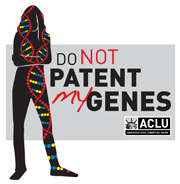The ACLU has taken on a patent case for the first time in its nearly 90-year history. The government’s been allowing private companies to patent human genes. The ACLU thinks that violates the First Amendment and patent law. This is heady, complicated stuff. But when a patent creates a monopoly that restricts the free flow of information, a lot is at stake, and when we’re talking about something like genes associated with breast and ovarian cancer, real women are hurt. This video about the case features some of those women’s stories.
Please note that by playing this clip You Tube and Google will place a long-term cookie on your computer. Please see You Tube’s privacy statement on their website and Google’s privacy statement on theirs to learn more. To view the ACLU’s privacy statement, click here.
“How can it be that a company controls genes? How is that possible?” Barbara Brenner asks in the video. She’s the director of Breast Cancer Action and one of the plaintiffs in the lawsuit.
We hope this short video will inform and inspire. It provides a simple explanation and overview of the issues in our case against the U.S. Patent and Trademark Office, which granted Myriad Genetics patents on the BRCA1 and BRCA2 genes, the genes associated with breast and ovarian cancer. The video also features the women directly affected by the patents. They represent any number of mothers and daughters you may know facing the same obstacles as three of the plaintiffs in our case, Genae Girard, Lisbeth Cerianai, and Runi Limary.

The results from Myriad’s genetic test are a strong factor in women’s decision to have children. Breast cancer survivor Genae Girard, 39, took Myriad’s genetic test to determine if she’s at risk for ovarian cancer. Her test results showed that she’s at a high risk for the cancer, and should have her ovaries removed. Because only Myriad holds the patents on the genes associated with breast and ovarian cancer, no one else can offer this genetic test without its permission. Therefore Girard can’t get a second test, or a second opinion, on whether to have her ovaries removed.
Lisbeth Ceriani, a single mom, simply can’t afford the more than $3,000 test. Getting the test paid for by insurance can be difficult.
“I’d like to see my 8-year-old daughter go to college,” Ceriani says. “But if I have the mutation, there’s a huge chance I’ll end up with ovarian cancer in the immediate future. I need to have that test so I can get my ovaries out if I need to before anything happens. I don’t like those odds.” Myriad’s monopoly on the genes, and therefore the genetic test, prevents other companies from offering this potentially life-saving test at a lesser cost to patients.
Dr. Wendy Chung, Director of Clinical Genetics at Columbia University and another plaintiff in the case, says she too often sees women like Girard and Runi Limary who can’t seek second opinions and are given little data to understand what their tests results mean because of the patents.
Limary had breast cancer at 28 and took Myriad’s test to find out if it was likely to return and if ovarian cancer is a concern. The result was puzzling: Limary was told she had a genetic variant of “uncertain significance.” It turns out other Asian-American women like Limary had also received these results. But because patent-holder Myriad has not determined the variant’s significance, and other companies are excluded from offering the test, these women are left to guess whether their variants warrant removal of their ovaries along with their ability to have children.
Tania Simoncelli, ACLU science advisor, says a lot is at stake if companies like Myriad are allowed to own genes and have a monopoly on everything associated with those genes.
“They own not only the gene, they own any future tests, any future drug, any future therapy, so we’re putting our trust in one single company,” says Simoncelli. “There are places where the patent system has gone too far. Too much patent protection can in fact trample our civil liberties.”
Please share this video far and wide and let others know why it is important that we stop the government from allowing companies like Myriad to own our genes.


